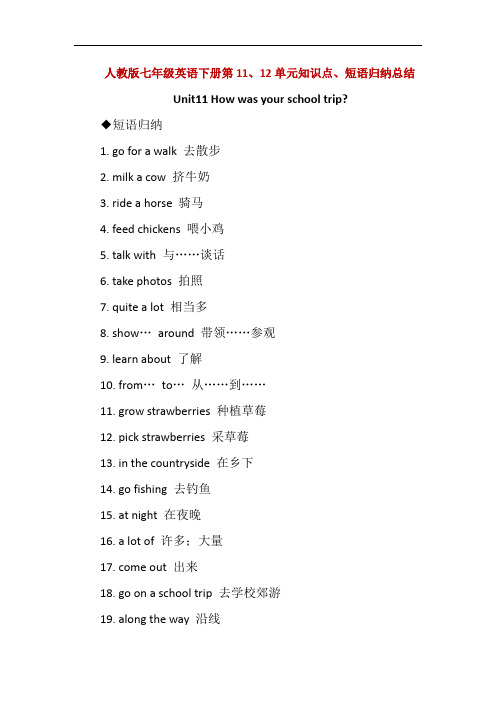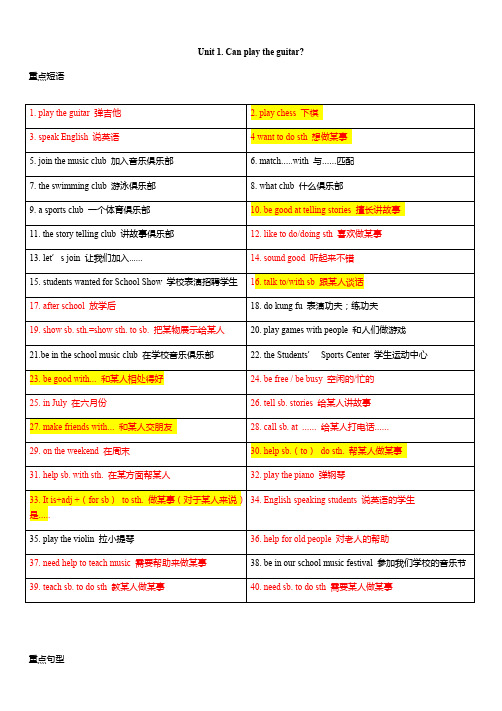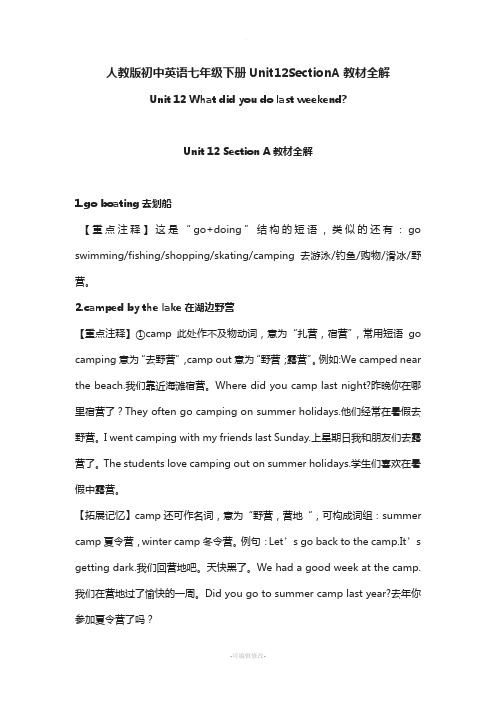人教版七年级下册短语+句子 Unit12
- 格式:docx
- 大小:15.90 KB
- 文档页数:4

人教版七年级英语下册第11、12单元知识点、短语归纳总结Unit11 How was your school trip?◆短语归纳1. go for a walk 去散步2. milk a cow 挤牛奶3. ride a horse 骑马4. feed chickens 喂小鸡5. talk with 与……谈话6. take photos 拍照7. quite a lot 相当多8. show…around 带领……参观9. learn about 了解10. from…to…从……到……11. grow strawberries 种植草莓12. pick strawberries 采草莓13. in the countryside 在乡下14. go fishing 去钓鱼15. at night 在夜晚16. a lot of 许多;大量17. come out 出来18. go on a school trip 去学校郊游19. along the way 沿线20. after that 之后21. buy sth. for sb. 为某人买某物22. all in all 总的来说23. take a / the train 乘火车24. be interested in 对……感兴趣25. not…at all 根本不……◆用法集萃1. How + be…? + like? ……怎么样?2. too many + 可数名词复数太多的……3. teach sb. how to do sth. 教某人怎样做某事4. quite + a / an + 形容词+可数名词单数= a + very + 形容+可数名词单数一个相当/ 很……的......◆典句必背1. —How was your school trip? 你的学校郊游怎么样?—It was great! 好极了!2. —Did you go to the zoo? 你去动物园了吗?—No, I didn’t. I went to a farm. 不,没有。

Unit 12 Don’t eat in class. ⼀、词组 school rules 学校规章制度 break the rules 违反规章制度 in the hallways 在过道 listen to music 听⾳乐 in the music room 在⾳乐教室⾥ in the dining hall 在餐厅 sports shoes 运动鞋 gym class 体育课 after school 放学后 have to do 不得不做 too many 太多 get up 起床 by ten o’clock ⼗点之前 make dinner 做饭 the children’s palace 少年宫 ⼆、句型 (1)—Don’t arrive late for class. (2)—We can’t listen to music in the hallways,but we can listen to it outside. (3)—What else do you have to do? -- We have to clean the classroom. (4)--Can we wear hats in school? --Yes,we can/ No,we can’t. (5)-Do you have to wear a uniform at school? -Yes,we do /No,we don’t. 重难点精析 祈使句 通常⽤来表⽰命令、请求、禁⽌、建议、警告等语⽓。
它的主语you(听话⼈)通常省略。
其构成通常有以下⼏种形式。
1)Be型(即系动词原型be+表语+其他)。
如:Be quiet,please. 否定句Don’t + be+表语+其他。
如:Don’t be angry. 2)Do型(即系动词原形+宾语+其他)。
如: Open you books,please. 否定句Don’t +实义动词原形+宾语+其他。

Unit 1. Can play the guitar?重点短语重点句型1. —Can you swim?你会游泳吗?—No,I can’t.不,我不会。
2. Can you play the guitar?你会弹吉他吗?3. I want to join the art club.我想参加艺术俱乐部.4. What club do you want to join?你想参加什么俱乐部?5. You are very good at telling stories.你非常擅长讲故事。
6. Sounds good. But I like to draw,too.听起来不错。
但我也喜欢画画。
7. Then join two clubs—the story telling club and the art club!那么就请加人两个俱乐部——讲故事俱乐部和艺术俱乐部。
8. 一Can Wu Jun speak English?吴俊会讲英语吗?一No,he can’t, but he can speak Chinese.不会,但他会讲汉语。
9. Are you good with old people?你与老人们相处得融洽吗?10. Can you play the piano or the violin?你会弹钢琴还是会拉小提琴?Unit 2 What time do you go to school?重点短语重点句型1. What time do you go to school?你几点去上学?2. 一What time do you usually take a shower,Kick?瑞克,你通常几点钟淋浴?—I usually take a shower at six forty.我通常六点四十淋浴。
3. 一When do you go to work? 你什么时候去上班?一At eleven o’clock, so I’m never late for work.十一点,我上班从来没有迟到4. —What time do they get dressed?他们几点钟穿上衣服?一They always get dressed at seven twenty.他们总是七点二十穿上衣服。

Unit11Howwasyourschooltrip?一、短语归纳1.goforawalk去散步kacow挤牛奶3.rideahorse骑马4.feedchickens喂小鸡5.talkwith与,谈话6.takephotos拍照7.quitealot相当多8.show...around带领...参观9.learnabout了解10.from...to...从...到...11.grow/pickstrawberries 种植/采草莓12.inthecountryside在乡下13.gofishing去钓鱼14.atnight在夜晚15.alotof许多;大量eout出来17.goonaschooltrip去学校郊游18.alongtheway沿线19.afterthat之后20.buysth.forsb.为某人买某物21.allinall总的来说22.takea/thetrain 乘火车23.beinterestedin 对,,感兴趣24.not, atall 根本不,,二、重要句型1.Howwasyourschooltrip?How+be+主语?=Whatbe+主语+like?意为“,,怎么样?”答语:Itwasgreat./ItwasOK./Itwas/wasn’tgood.2.quietalotof+可数名词(复数)/不可数名词,也可单独使用。
e.g.Wedrankquitealotofmilk.Isawquitealotofcows.Iplaytennisquitealotinthesummer.1)quitealittle+不可数名词,意为“相当多”;e.g.Thereisquitealittlewaterinthebottle.2)quiteafew 相当多+可数名词,意为“相当多”。
e.g.Quiteafewstudentswerelate.3.take与photo,picture等词搭配时,意为“拍摄,摄影”。

最新人教版七年级英语下册单元知识归纳Unit12Unit 12 What did you do last weekend?重点清单1.do one's homework 做家庭作业2.go to the cinema 去看电影3.go boating 去划船4.camp by the lake 在湖边露营5.go to the beach 去海边6.play badminton 打羽毛球7.living habits 生活习惯8.have a good weekend 度一个好周末9.stay up 熬夜10.two weeks ago 两个星期前11.go camping 去露营12.put up 穿(戴)上13 make a fire 生火14.each other 相互15.get a surprise 吃惊16.look out of 朝外看17.shout to ... 对 ... 大喊18.start to do sth. 开始做某事19.up and down 到处20.wake ... up 叫醒 .......21.1stayed up late to watch the soccer game・我熬夜看足球比赛。
22.1worked as a guide at the Natural History Museum.我在自然历史博物馆当导游。
23.They have a butterfly house with over 200kinds of butterflies.他们有一个蝴蝶屋,里面有200多种蝴蝶。
24.There we put up our tents and made a fire to keep us warm and cook food on.在那我们支起一个帐篷,并生火取暖,在火上烹饪食物。
25.1was so tired that I went to sleep early.我太累了,因此很早就去睡觉了。

人教版初中英语七年级下册Unit12SectionA教材全解Unit 12 What did you do last weekend?Unit 12 Section A教材全解1.go boating去划船【重点注释】这是“go+doing”结构的短语,类似的还有:go swimming/fishing/shopping/skating/camping去游泳/钓鱼/购物/滑冰/野营。
2.camped by the lake在湖边野营【重点注释】①camp此处作不及物动词,意为“扎营,宿营”,常用短语go camping意为“去野营”,camp out意为“野营;露营”。
例如:We camped near the beach.我们靠近海滩宿营。
Where did you camp last night?昨晚你在哪里宿营了?They often go camping on summer holidays.他们经常在暑假去野营。
I went camping with my friends last Sunday.上星期日我和朋友们去露营了。
The students love camping out on summer holidays.学生们喜欢在暑假中露营。
【拓展记忆】camp还可作名词,意为“野营,营地“,可构成词组:summer camp夏令营,winter camp冬令营。
例句:Let’s go back to the camp.It’s getting dark.我们回营地吧。
天快黑了。
We had a good week at the camp.我们在营地过了愉快的一周。
Did you go to summer camp last year?去年你参加夏令营了吗?②by the lake在湖边,by此处是介词,意为“在……旁边”、“在……近旁”、“在……手边”,此时要注意它与介词near有所不同,即by表示的距离更“近”。
Unit 12 what did you do last weekend?Section A 知识讲解一. last(1)last形容词“最后的,最末的”或者“紧接前面的,刚过去的”。
Today is the last day in the year.最后一天。
I didn’t sleep well last night. 昨晚(2)last副词,“最后地”,I’m the last one.最后一个。
(3)last 动词,“持续,继续,维持”等,The hot weather lasted a week.持续了一周。
二. camp(1)camp 动词,“扎营,搭帐篷”。
We go camping every summer.We walked all day and camped by a river at night.(2)camp 名词,“露营地,度假营”。
Let’s go back to the camp, it’s getting dark. 让我们回营地吧,天黑下来了。
根据汉语提示填空。
(1)When did you join the ______ ______ (夏令营)?(2)I like ______ ______ (去宿营)in the open air.3)We______(宿营)in the forest last night. (4)Let’s go back to the ______(营地)三. sheepsheep 可数名词,“绵羊”,复数还是sheep;goat指山羊。
How many sheep are there on your farm? 你们农场里有多少只羊?拓展:常见的单复数同形的名词还有:deer (鹿),fish (鱼),Chinese (中国人),Japanese(日本人)等。
四. byby介词, “在……旁边”,相当于beside。
Our teacher is sitting by the window.by与交通工具名词连用时,名词前不用冠词,意为“乘、坐、用”等。
最新人教版七年级英语下册重点短语及句型Unit 1重点短语:1、一个运动俱乐部 a sports club2、象棋俱乐部 chess club3、想加入一个英语俱乐部want to join an English club4、音乐俱乐部 music club5、讲故事俱乐部 the story telling club6、美术俱乐部the art club7、弹吉它 play the guitar8、敲鼓 play the drums9、给……说 /与……交谈talk to/with…10、喜欢做某事 like to do / doing sth11、和…一块玩游戏 play games with…12、帮助(某人)做某事 help (sb) with sth / help (sb) (to) do sth13、说英语的学生English-speaking students14、打电话找某人 call sb at + 电话号码15、有空be free16、善于与某人相处be good with sb17、擅长做某事be good at doing sth18、与某人交朋友 make friends with sb19、在周末on /at the weekend = on / at weekends20. 讲故事tell stories重点句子:1.你会弹吉它吗?Can you play the guitar?2.你会唱歌或跳舞吗?Can you sing or dance?3.你非常擅长讲故事。
You are very good at telling stories.4.学校文艺表演招募学生students wanted for school show5.来加入我们吧!Come and join us!6.我喜欢和人们一块谈话和玩游戏。
I like to talk and play games with people.7.放学后你忙吗?Are you busy after school?8.请拨293-7742找布朗先生。
Unit 1 Can you play the guitar? 1.play chess 下国际象棋play the guitar 弹吉他弹吉他弹吉他2.speak English 说英语English club 英语俱乐部英语俱乐部3.talk to 跟…说 play the violin 拉小提琴拉小提琴拉小提琴4.play the piano 弹钢琴弹钢琴弹钢琴 play the drums 敲鼓敲鼓敲鼓5.make friends 结交朋友结交朋友6.do kung fu 会(中国)功夫会(中国)功夫会(中国)功夫 7.tell stories 讲故事讲故事 play games 做游戏做游戏 8.on the weekends (在)周末(在)周末(在)周末 用法集萃用法集萃play +棋类/球类球类 下……棋,打……球 1.play the +西洋乐器西洋乐器西洋乐器 弹/拉……乐器乐器2.be good at doing sth.= do well in doing sth. 擅长做某事3.be good with sb. 善于与某人相处善于与某人相处4.need sb. to do sth. 需要某人做某事需要某人做某事5.can + 动词原形动词原形 能/会做某事会做某事6.a little + 不可数名词不可数名词不可数名词 一点儿……7.join the …club 加入加入…俱乐部俱乐部8..like to do sth. =love to do sth. 喜欢/喜爱做某事喜爱做某事 like ding sth.喜欢做某事喜欢做某事典句必背Can you draw? Yes, I can. / No, I can’t. 1. What club do you want to join? 2. I want to join the chess club. 3. You can join the English club. Sounds good. 4. I can speak English and I can also play soccer. 5. Please call Mrs. Miller at 555-3721. 重点句子点拨:重点句子点拨:1、Can you play the guitar?你会弹吉他吗?点拨1:can 是情态动词,它的意思是能、会,表示某人具有做某事的能力,情态动词后必须用动词原形,情态动词can 没有人称和数的变化。
人教版七年级下Unit 12重点短语、句子Unit 12 Don’t eat in class.一、重点短语:1. in class 在课堂上2. School (Library/Family) Rules 校规(图书馆规章制度/家规)3. arrive late for class 上课迟到4. in the hallways 在走廊里5. in the classrooms 在教室里6. listen to music 听音乐7. Ms Clark 克拉克女士8. wear a hat 戴着帽子9. listen to music outside 在外面听音乐10. in the music room 在音乐房里11. in the dining hall 在餐厅里12. eat outside 在外边儿吃13. sports shoes 运动鞋14. gym class 体育课15. the rules at your school 学校的规章制度16. have to 不得不;必须17. after school 放学后18. go out on school nights 在学校行课日(有课)的晚上外出19. too many rules太多规矩20. every morning 每天早上21. be in bed 睡觉22. by ten o’clock/10:00 在十点钟之前23. wash my clothes 洗我的衣服24. make dinner 做晚餐25. the Children’s Palace 少年宫26. learn the piano 学钢琴27. never have any fun 从未有任何乐趣;从来都不开心28. go to bed去睡觉29. talk loudly 大声地说话30. ride one’s bike 骑某人的自行车31. wear a helmet戴着头盔(防护帽)*32. so many 很多;如此多的*33. hang out with sb. 和某人一起闲逛二、重点句子:1.What else do you have to do? 你还要干别的什么事?ter I have to go to the Children’s Pal ace to learn the piano.然后(稍后)我必须去少年宫学钢琴。
Unit 12 What did you do last weekend?
Ⅰ. Phrases / 短语
1. last weekend 上周末
2. go boating 去划船
3. camp by the lake 湖畔扎营
4. play badminton 打羽毛球
5. do/play sports 做运动;进行体育活动
6. tell sb. about… 告诉某人关于…...
7. have a good weekend 度过一个愉快的周末
8. kind of 有点儿;有几分
9. stay up 熬夜
10. take a long bus ride to... 乘长途车去......
11. a special gift 一件特殊的礼物
12. put up a tent 搭帐篷
13. keep sb. warm 使某人暖和
14. on the first night 在第一个夜晚
15. tell a story 讲故亊
16. each other=one another 彼此
17. go to sleep 去睡觉
18. get a surprise 感到吃惊
19. look out of... 朝......外看
20. see sb. doing 看见某人正在做......
21. see sb. do 看到某人做了......
22. jump up and down 跳上跳下
23. make a fire 生火
24. move into... 搬进......
25. so...that... 如此…...以致于......
26. a family of mice 一窝老鼠
27. climb onto... 爬到......上
28. shout at sb. 冲某人(生气地)喊
29. shout to sb. 对某人大声喊
30. run away 逃跑/走
31. have a busy weekend 度过一个繁忙的周末
32. stay at home 呆在家里
33. go for a walk 去散步
34. the next morning 第二天早上
35. wake up 醒来
36. by the lake 在湖边
Ⅱ. Sentences / 句子
1. What did you do last weekend?
你上周末做了什么?
2. Well, on Saturday, I played badminton.
噢,在周六我打羽毛球了。
3. How was your weekend?
周末过得怎么样?
4. I stayed up late to watch the soccer game.
我熬夜看足球赛了。
5. Did you do anything interesting last weekend?
上周末你做有趣的事情了吗?
6. But I was so tired that I went to sleep early.
但是我如此累,以至于我早早就睡着了。
7. When we looked out of our tent, we saw a big snake sleeping near the fire.
我们向帐篷外望去时,看见一条大蛇正在篝火附近睡觉。
8. What an interesting job they have!
他们的工作多么有趣啊!
9. I worked as a guide at the Natural History Museum.
我在自然历史博物馆当了一名导游。
10. They have a beautiful house with over 200 kinds of butterflies!
它们(指博物馆)有一个漂亮的房子,里面有200多种蝴蝶。
11. Did you have a good weekend?
你周末过得愉快吗?
12. Where did she go last weekend?
她上周末去了什么地方?
13. She went to a farm.
她去了一家农场。
14. Who did she go with?
她和谁一块去的?
15. She went with her classmates.
她和她的同学们一起去的。
16. There we put up tents and made a fire to keep us warm and cook food on.
在那里我们搭起帐篷,生火取暖,在上面做饭。
17. I was so scared that I couldn't move.
我如此害怕,(以至于我们)都不能动。
18. We shouted to our parents to let them know about the danger.
我大声呼喊我们的父母,让他们知道危险(所在)。
19. It can feel things moving.
它能感受到东西在移动。
20. He also told me it was important not to go near a snake.
他还告诉我重要的是不要靠近蛇。
21. This was a very useful lesson for me.
这对我来说是很有用的一课。
22. Who visited her grandma?
谁去看望了她的祖母?
23. I told the visitors about them and their living habits.
我向游客介绍这些蝴蝶以及它们的生活习性。